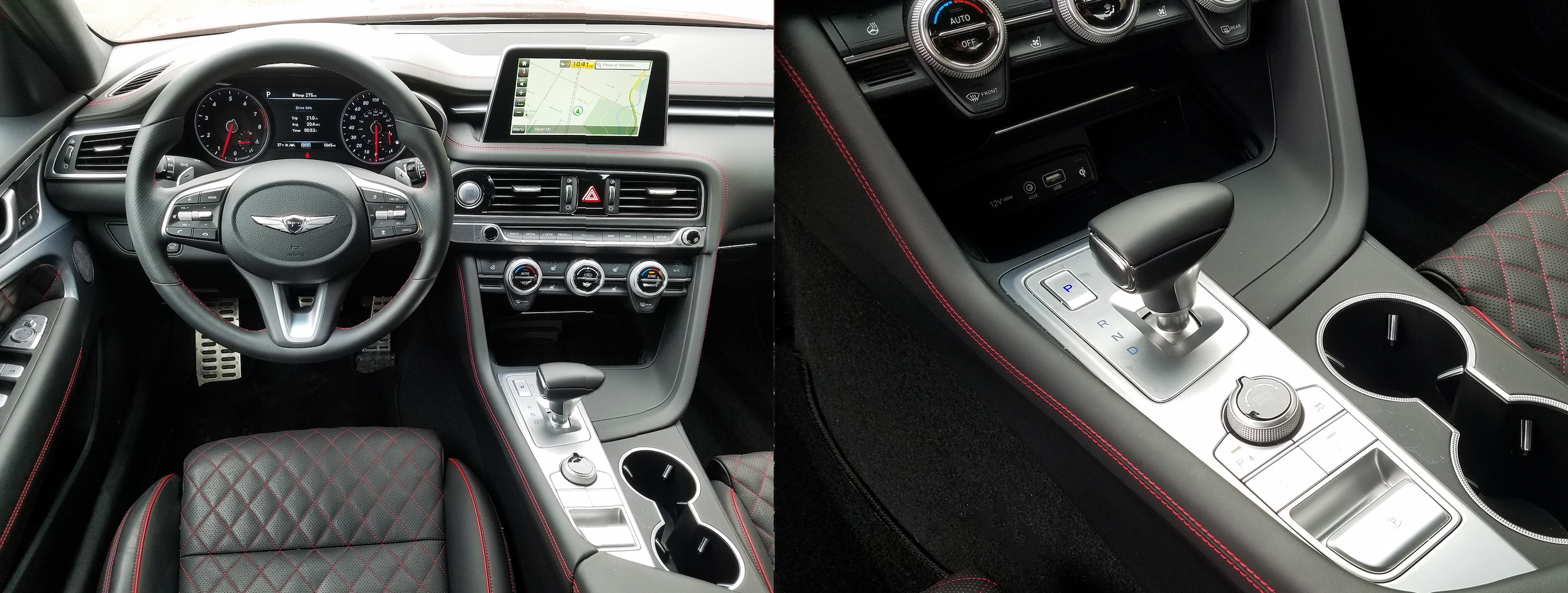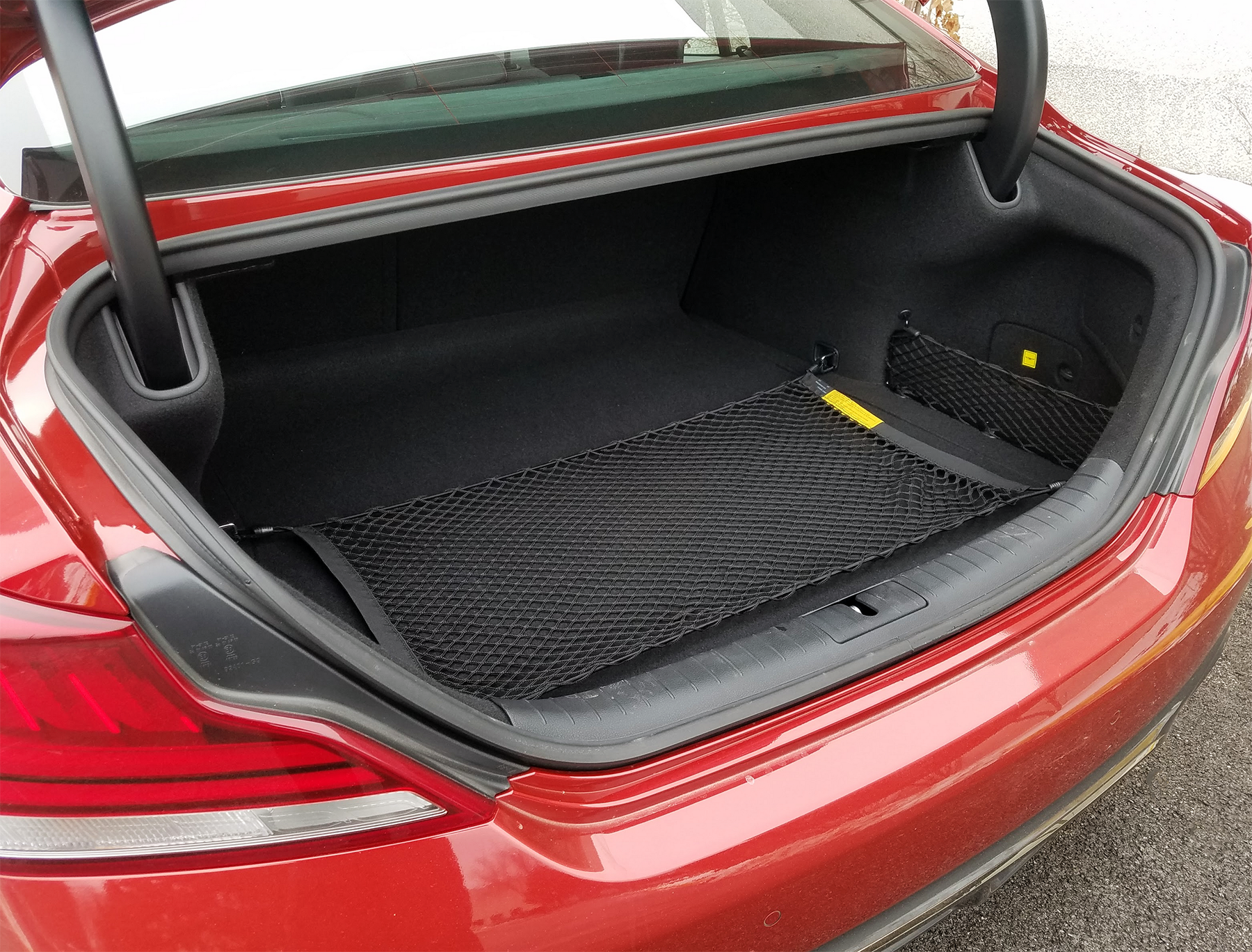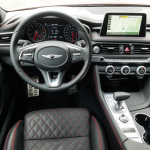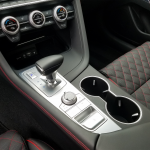

2020 Genesis G70 AWD 3.3T Sport
Class: Premium Compact Car
Miles driven: 499
Fuel used: 28.6 gallons
| CG Report Card | |
|---|---|
| Room and Comfort | C |
| Power and Performance | B+ |
| Fit and Finish | A |
| Fuel Economy | B- |
| Value | A |
| Report-card grades are derived from a consensus of test-driver evaluations. All grades are versus other vehicles in the same class. Value grade is for specific trim level evaluated, and may not reflect Consumer Guide's impressions of the entire model lineup. | |
| Big & Tall Comfort | |
| Big Guy | B- |
| Tall Guy | B- |
| Big & Tall comfort ratings are for front seats only. "Big" rating based on male tester weighing approximately 350 pounds, "Tall" rating based on 6'6"-tall male tester. | |
| Drivetrain | |
| Engine Specs | 365-hp 3.3-liter |
| Engine Type | Twin-turbo V6 |
| Transmission | 8-speed automatic |
| Drive Wheels | AWD |
Real-world fuel economy: 17.4 mpg
Driving mix: 70% city, 30% highway
EPA-estimated fuel economy: 17/25/20 (city, highway, combined)
Fuel type: Premium gas recommended
Base price: $46,650 (not including $995 destination charge)
Options on test vehicle: Elite Package ($1450), Prestige Package ($2850), Sport Package ($1300)
Price as tested: $53,245
Quick Hits
The great: Acceleration; cabin trim; features for the money
The good: Outward visibility; control layout; ride/handling balance
The not so good: Rear-seat space is tight for adults; stingy front-door apertures; mediocre observed fuel economy
CG Says:
When Consumer Guide editors tested an inaugural Genesis G70 in 2019, we found a lot to like about the South Korean newcomer to the premium-compact sedan field. Genesis pretty much left well enough alone for year two, and so are we. By our reckoning the G70 continues to be an eminently enjoyable entry-luxury car with a good value proposition.

As a quick catch-up for anybody who still might be thinking “What the heck is a Genesis?” the G70 is the third—and so far smallest—member of Hyundai’s luxury brand launched in 2017. As of the 2020 model year, it’s composed of just small, medium (G80), and large (G90) sedans, but a GV80 midsize crossover is coming as a 2021 product. As a starting point for the G70, Genesis surveyed the corporate stable and saddled the platform of the well-received Kia Stinger hatchback with a sedan body.

Both G70s that CG has had the chance to test were equipped with all-wheel drive and the 365-horsepower 3.3-liter twin-turbocharged V6 that are alternatives to rear-wheel drive and a 252-horse turbo four. (Both engines are available with both drivelines.) The biggest difference between the cars, for as far is it goes, is that the 2020 tester was outfitted with the $1300 Sport Package option. This adds an electronically controlled suspension, a different style of 19-inch alloy wheels, grippier summer tires on rear-drive cars (or all-season rubber with AWD), copper headlight-bezel accents, dark-tint taillight covers, dark-chrome grille and window trim, and quilt-pattern black Nappa-leather seats.
Test Drive: 2020 Jaguar XE P250 S

A Sport-Package G70 will better look the part of a sport sedan, and it stands to make some gains in handling, even if incremental. Our latest run in a G70 fairly mirrored our first. With the turbos quickly engaged, the 3.3 V6 gets the car off to a vibrant, somewhat snarly start (2019 CG testing reported zero to 60 mph in 4.6 seconds), with crisp downshifts from the 8-speed automatic transmission to keep the fun going when a burst is needed while already at speed, such as in highway driving. Ride and handling are day-in/day-out enjoyable in the “Comfort” drive mode, with “Sport” delaying transmission shifts and firming up the ride somewhat.
CG wasn’t as happy with the V6 G70’s fuel economy in 2019, logging 20.2 mpg with roughly 40 percent city driving. It didn’t appear to be any better a year later. The EPA projects an AWD 3.3 G70 should get 17 mpg in city driving, 25 mpg on the highway, and 20 in combined use.
The ’20 test car went from a starting price of $47,645 with delivery to a final $53,245 thanks to the additions of the Sport, Prestige, and Elite option groups. The 2019 car had the Prestige and Elite packages, both of which are differently stocked—and priced—for ’20. With a sunroof added as standard equipment, it has been replaced in the Elite Package by a heated steering wheel and ventilated front seats, reducing the cost of the option by $300. Meanwhile, a power trunk release has been added to the Prestige Package, which grows by $350.
The interior is nice, but not exactly roomy. Rear-seat legroom is tight, especially when front-seat occupants need to stretch out, and 6-footers will test the limits of headroom under the slope of the roof. A pronounced divider in the middle of the rear seat clearly marks this as a 4-passenger car, regardless of the ages or builds of passengers.

At least the seats are comfy, with good side grip in the front positions. Driver vision is quite good all around, and doors open wide for easy entries and exits. However, when the doors are fully open, it takes a very long reach to the armrest to be able to pull the door closed. Apart from a good-size glove box, interior storage is modest, with small pockets on the doors, a small covered console box, a covered bin for device inputs and optional Qi wireless charging at the front of the console, and exposed cup holders in the console and rear armrest. The Lexicon 15-speaker audio system and dual-zone automatic climate controls are easy to figure out and operate.
The trunk is wide and deep, but doesn’t seem as tall as some other sedans. Sickle-shaped hinges retract into covers to protect stored items. Rear seats fold flat to expand load space, though there is a slight gap where the trunk floor meets the folded seats. The threshold from trunk to seats narrows, too.
Rear-seat room may give some shoppers pause, but the Genesis G70’s many positive attributes for the price keep it a worthwhile proposition.

Listening fun: complete Car Stuff Podcast index
2020 Genesis G70



















